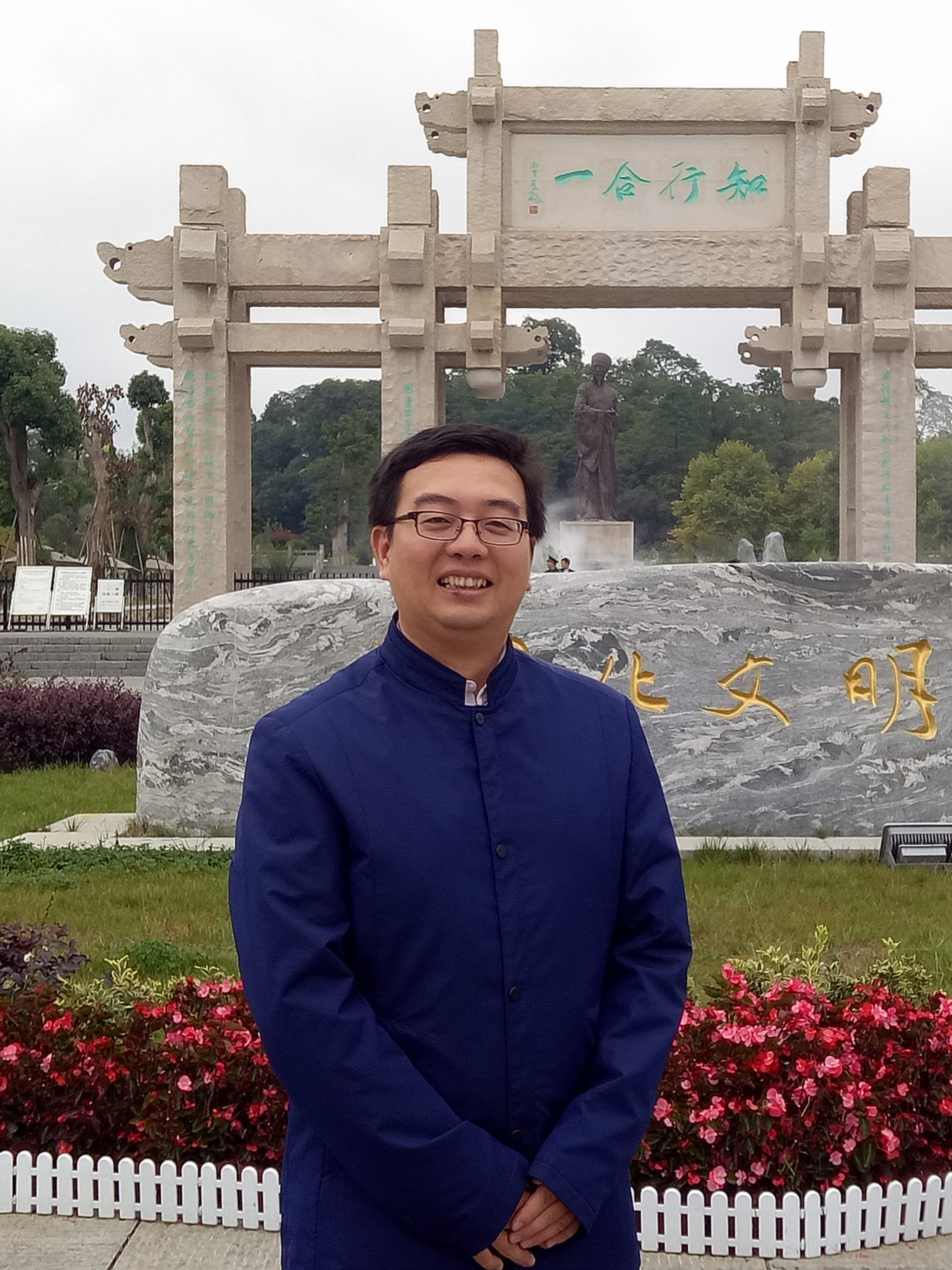【Basic information】
Name: LU Xing
Gender: Male
Administrative Position:Director, Institute of Chinese Philosophy; Deputy Dean, College of Philosophy
Academic Title:Professor, Doctoral supervisor
Education:Ph.D
Office:Room 508, College of Philosophy
Email:luxing@nankai.edu.cn
Areas of Research:Confucian philosophy, Chinese modern philosophy, East Asian Confucianism
Academic Organization Memberships:Fellow of History of Chinese Philosophy Academy, Fellow of Chinese Confucius Academy, Fellow of Tianjin Philosophy Academy
【Bio】
LU Xing, Han nationality, native in Hanzhong city in Shaanxi province, born in Chengdu city in Sichuan province, (October 1981-).
【Education】
2006-2009 PhD of Chinese Philosophy, Department of Philosophy, Nankai University.
2004-2006 Master of Chines Philosophy, Department of Philosophy, Nankai University.
2000-2004 Bachler of Philosophy, Department of Philosophy, Nankai University.
【Work Experience】
2020- Professor in Branch Chinese Philosophy, School of Philosophy, Nankai University
2016-2017 Visiting scholar in Kyujanggak Institution, Seoul National University, South Korea
2013-2019 Associate Professor in Branch Chinese Philosophy, School of Philosophy, Nankai University
2009-2012 Lecturer in Branch Chinese Philosophy, School of Philosophy, Nankai University
【Teaching】
1. Undergraduate courses
History of Chinese Philosophy, Confucian Philosophy, Modern Chinese Philosophy, Contemporary Chinese Philosophy, Research on Chuan Xi Lu, Introduction for Confucianism, Innovative research and training
2. Graduate course
Method for History of Chinese Philosophy, Classics in Chinese Philosophy, Study for Modern New Confucianism (Also for PhD students), Study for Contemporary Chinese philosophy, Modern Chinese philosophy and culture
【Selected Publications】
1. Monographs
Mou Tsung-san’s philosophy and Construction of Chinese modernity, Beijing: Social sciences academic press, published in Nov 2019, 390,000 characters. (Result of National Social Science Foundation)
2. Articles
(1) “Four beginnings” “Seven emotions”: the Internal Development of Confucian Emotion Philosophy, in Philosophy Research, No.6, 2018.
(2) Liberty, Wealth-power, State governance: Characters of Yen Fu’s Liberalism, in Philosophical Trends, No.3, 2015.
(3) On the interpreting methods of Mou Tsung-san’s Chu Hsi Study, in Modern Philosophical, No.5, 2019.
(4) Logic and Levels of Confucian “Benevolence Virtue”, in Ethics Research, No.2, 2016.
(5) Ideological content and Character of Political Consultation Tradition in Ancient China, in Tianjin Social Sciences, No.5, 2015.
(6) Reflect on “weber’s proposition” from East Asia Modernity’s rise, in Foreign Social Sciences, No.2, 2017.
(7) Between the “Anthropocentrism and the Non-anthropocentrism”: New research of Confucian ecological philosophy’s localization, in Henan Social Sciences, No.3, 2020.
(8) Analysis on Liang Shu-ming’s Thought of “Chinese Democracy”: Also related the Relation between Confucian thought and Deliberative Democracy, in Journal of QI LU, No.2, 2017.
(9) Deliberative Democracy and Chinese Excellent Traditional Culture, In Guang Ming Daily, 7th April 5, 2015.
(10) On Mou Tsung-san’s “Moral-history Teleology”, in Journal of East China Normal University (Philosophy and Social Science), No.2, 2014.
(11) “Hume’s Law” and Chinese Modern Philosophical Thoughts, in Thinking (Si Xiang Zhan Xian), No.4, 2013.
(12) On “Practice” Notion in Mou Tsung-san’s Philosophy, in History of Chinese Philosophy, No.3, 2012.
(13) Mou Tsung-san’s Reconstruction on Kant’s Theory of “Thing-in-itself” and the Inner Problems, in Journal of South China Normal University, No.1, 2011.
(14) Rethink and Reconstruction of the Chinese Cultural Identity in the Age of Globalization: Base on the Post-colonialism Theory’s View, in Jiangxi Social Sciences, No.4, 2011.
(15) Does “Fact / Value” equal to “Phenomenon / Noumenon”? An Examination of Mou Tsung-san’s “Theory of Innate-conscience’s Self-negation”, in Henan Social Sciences, No.4, 2011.
(16) On the Spiritualism Tradition of Chinese Philosophy: from the Aspect of Mou Tsung-san’s Philosophy, in Philosophical Trends, No.7, 2011.
(17) On Mou Tsung-san’s View of Freedom and Its Relation with German Classical Philosophy, in Tianjin Social Science, No.5, 2010.
(18) The Development of Mou Tsung-san’s “Theory of Innate-conscience’s Self-negation”, in History of Chinese Philosophy, No.2, 2008.
(19) A Comparison between Mou Tsung-san’ and Lao Ssu-kwang’s views of Confucianism, in Journal of QI LU, No.5, 2008.
(20) Mou Tsung-san and Wang Yangming’s Theory, in Thinking (Si Xiang Zhan Xian), No.5, 2008.
【Research Grants】
(1) “Four Seven Debate and Development of Confucian Emotion Philosophy” (19FZXB096), National Social Science Foundation Post-Funded Projects, under research.
(2) “Mou Tsung-san’s philosophy and Construction of Chinese Modernity” (13FZX019), National Social Science Foundation Post-Funded Projects, be finished.
(3) “Confucian Individual in the Perspective of China-West Comparison” (TJZX12-003), Tianjin Philosophy and Social Science Project, be finished.
(4) “Deliberative Democracy and Chinese traditional political Wisdom” (NKZXA1413), Fundamental Research Funds for the Central Universities, under research.
(5) “Mou Tsung-san and Reconstruction of Confucian Philosophy Tradition” (NKZXB10140), Fundamental Research Funds for the Central Universities, be finished.
【Honors and Awards】
3rd Prize for Young teachers teaching the basic skills competition in Tianjin, 2010
“Teacher Pioneer” in Tianjin’s education system, 2012
3rd Prize for Tianjin 16th social science outstanding achievement, 2019
2rd Prize for Tianjin 17th social science outstanding achievement, 2021
Humanities and social science outstanding achievement of Nankai University, 2019
“Charming Teacher” for Ning Yi Hong Dao Reward of Nankai University, 2015
“Charming Teacher” for Ning Yi Hong Dao Reward of Nankai University, 2019




